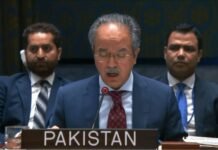Brussels, 24 March 2023 (TDI): Europe is facing an unprecedented energy crisis now. The European countries have planned out measures to address high prices along with secured energy supplies for Europeans.
The EU envisages tackling the energy crisis by cuts in energy use, filling gas storage reserves ahead of winter, avoiding price spikes, a platform to buy gas together, and solidarity in sharing supply.
Presently, the EU leaders are concerned about hikes in energy prices and disruption to the energy supply. The countries are united in their resolve to mitigate the impacts of the crisis and reduce risks.
The EU countries are closely coordinating measures and adopting means such as the joint purchase of energy to reduce the cost of imports.
Furthermore, in the current context of energy supply disruption by Russia, there needs to be solidarity among the EU countries providing support to countries with greater dependence on Russian energy.
The main features of the EU’s response mechanism include ensuring affordable and competitive energy for EU consumers. It also includes enhancing the EU’s energy security and preparedness in the event of emergencies.
The EU aims to strengthen the energy resilience and autonomy of all member states. The EU countries are working closely to limit excessive gas prices and improve sharing supply.
The countries are expediting their green transition initiatives as well as reducing energy dependencies.
The member states have agreed on the market mechanism which will limit the skyrocketed high gas prices. The mechanism includes applying a price ceiling for gas transactions when and if gas prices reach significant levels.
This regulation is a temporary emergency measure that aims to inhibit excessively high gas prices that do not reflect world market prices while ensuring the security of the energy supply and the stability of financial markets.
The EU member states have mutually agreed on the application of the mechanism to month-ahead, three months-ahead, and year-ahead derivative contracts.
The mechanism entered into force on 15 February 2023. It can be deactivated or suspended following pre-defined rules in the regulation.
Due to the volatile nature of the market, the member states have agreed to improve solidarity across the EU and better coordinate the joint buying of gas. The new measure enables the member states to buy gas jointly.
Pooling demand at the EU to have better leverage while buying gas and that member states don’t outbid each other in the process.
The new regulation also introduces a new price benchmark. It will provide stable and predictable pricing for transactions of liquefied natural gas, complementing the Title Transfer Facility (TTF).
The EU envisions cutting energy costs for households and businesses. It will do so by reducing electricity use, limiting revenues of electricity producers, and securing a solidarity contribution from the fossil fuel business.
The restriction of electricity consumption is expected to ensure a positive effect on EU electricity prices. The member states have agreed to reduce the use of electricity by at least 5% during peak hours to help lower prices and cut the demand for gas used in power generation.
The reduction in electricity consumption is expected to have a positive effect on the EU electricity prices and as a consequence on consumers’ energy bills. EU countries agreed to reduce the overall use of electricity by at least 5% during peak hours, to cut demand for gas used in power generation and hence help lower prices.
The EU is aiming to reduce its energy dependency by diversifying its energy supplies and routes. It also aims to reduce reliance on fossil fuels and adopt energy efficiency. The member states are speeding up the development of renewable energy resources.
Reducing energy dependency on Russian fuels is the prime aim of new measures. This will ensure the EU’s energy resilience and autonomy.
The European Council has taken urgent measures to secure the supply of gas for the winter and cut gas demand in the EU, given the going war between Russia and Ukraine.
The new regulations establish solidarity arrangements between member states to help countries with no storage facilities on their territories.
The arrangement enables them to store 15% of their annual domestic gas consumption stocks in nearby member states.
The regulation also conditioned obligatory certification of all underground gas storage site operators to avoid the risk of external interference.
Also read: EU committed to ensuring water security for all
The EU countries are committed to the European Green Deal to cut greenhouse gas emissions and achieve climate neutrality by 2050. This requires replacing fossil fuels completely with cleaner forms of energy.
The green transition requires an accelerated reliance on green energy resources, reduced energy dependencies, and a cleaner environment, and improved health for all.
Renewable resources are the cheapest and the cleanest form of energy resources. They reduce dependence on energy imports.
The Council approved the target of the share of energy from renewable resources in the EU’s gross final consumption of energy to be 40% by 2023. The approach was adopted in the renewable energy directive in June 2022.
The increase in energy prices in Europe has been an outcome of various factors including extreme climate, heatwaves, increased demand for liquified natural gas, scarcity of nuclear and hydropower electricity generation, and miscellaneous.
Russia’s unilateral decision of stopping gas supply to several EU countries in 2022, also added to the energy crisis. The new measures are expected to elevate energy security in Europe.
The EU member states are united and committed to responding to the energy crisis and imbalance in the energy market with the new ambitious regulations.








